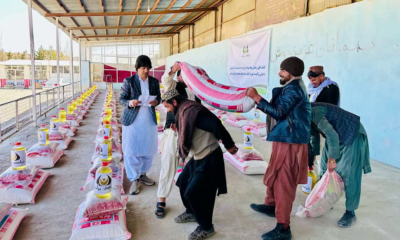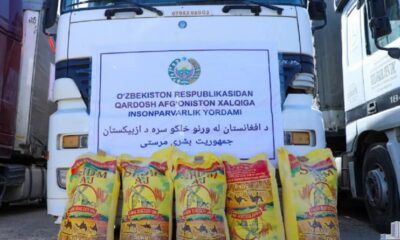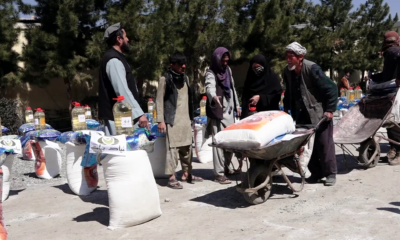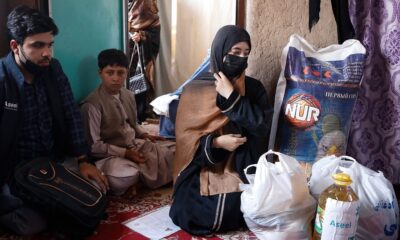Health
Tips to stay hydrated and healthy during Ramadan

During Ramadan, Muslims abstain from food and drink from dawn to dusk but it is important to get proper nourishment between Iftar and Sahari in order to be prepared for the next day – especially for those who need to work and go to school or university.
Healthy habits during the holy month are also very important in order to avoid gaining weight.
Cleveland Medical Center in Abu Dhabi, in the UAE, reports that there are a few simple times to help you stay fit while fasting.
Stay hydrated
The amount of fluids a person needs depends on age, gender, climate and activity level.
According to Cleveland Clinic, adults, on average, need 2 to 3 liters of water each day. So make sure to drink plenty of fluids before the start of the fasting hours. Unsweetened juices or milk are tasty, low calorie alternatives.
Experts warn against too much coffee and tea and soda drinks outside of fasting hours as the caffeine in them causes increased urination. Cleveland Clinic recommends these drinks be limited during the non-fasting hours.
The clinic also suggests that meals are started with broths, soups or stews. Fruits and vegetables such as watermelon, squash or spinach are mostly water and can also help to replace fluids.
Why is this important?
As stated by the clinic, the human body is about 60 percent water and it is vital for bodily functions, including metabolizing and transporting nutrients throughout the body and removing waste.
The amount of water in the body fluctuates – it is lost through urine and sweat and regained from food and drinks.
However, Cleveland Clinic states it is not unusual to become periodically dehydrated while fasting. Dehydration can result in weight loss that is quickly regained when normal eating and drinking habits resume.
Choose healthy options
Hunger tempts us to indulge or eat fast, convenient foods. But according to the Cleveland Clinic, highly processed foods are high in salt, sugar and unhealthy fats, which won’t last long and can increase thirst.
Try a handful of roasted nuts instead of ready-to-eat foods and also try to eat fresh fruit and vegetables.
Eat, rest and exercise strategically
According to clinic experts, planning your activities and meals after breaking your fast will help to refuel you and prepare you for the next day of fasting.
Rest is important, but be sure to stay awake long enough to replenish the fluids and nutrients your body needs.
Eat balanced meals including: bread, cereals and other grains; fruits and vegetables; meat, fish and poultry; milk, yogurt or cheese; and healthy fats.
Focus on foods that are digested slowly and release energy over time. These include food that are high in fiber (e.g. whole grains, fruits and vegetables) and foods containing complex carbohydrates (wheat, beans, lentils, rice, etc.).
It is important to stay active too. Find time to take a walk or do some gentle stretching.
Why is this important?
Weight loss occurs when a person uses more energy than they consume. Some studies on weight loss/gain during Ramadan have shown that energy intake remains the same or increases, despite a decrease in meal frequency.
Health
Global organizations warn of health crisis due to aid cuts in Afghanistan

Global organizations are raising alarms about the impact of aid cuts on Afghanistan’s health sector and the reduction in funding for humanitarian organizations operating in the country.
UN-affiliated bodies have stated that the complete suspension of aid from the United States and the reduction of the 2025 budget could lead to the closure or suspension of nearly 2,000 healthcare centers across Afghanistan.
The United Nations Office for the Coordination of Humanitarian Affairs (OCHA) has further warned that if only 25 percent of the required funding is provided, 7 million out of the 9.3 million people in need of medical services will be left without access to healthcare.
The report highlights that without immediate and sufficient funding, child mortality rates could rise sharply, as malnutrition remains one of the leading causes of death for children under the age of five.
The World Food Programme (WFP) has also warned that Afghanistan is facing a severe malnutrition crisis among children, with the number of malnourished children expected to reach 3.5 million by 2025.
Recent reports from the WFP reveal that 8 out of 10 families in Afghanistan are unable to afford a sufficient diet, and 3 out of 4 families are being forced to borrow money to purchase basic food items.
UN agencies have stressed the urgent need for the international community to address the humanitarian crisis in Afghanistan and provide the necessary aid.
This comes after Afghanistan’s Ministry of Economy dismissed reports from some international organizations about the growing poverty in the country, labeling them as exaggerated and far from reality.
Health
Health minister meets with Qatari envoy over building of 400-bed hospital in Kandahar

The Ministry of Public Health has announced that Noor Jalal Jalali, the acting public health minister, met with Murdif Al-Qashouti, the Chargé d’Affaires of the Qatari Embassy in Kabul, to discuss the construction of a planned 400-bed hospital by Qatar, the provision of equipment for hospitals, and the enhancement of the capacity of health workers in Kandahar province.
According to a statement, the Acting Minister of Public Health emphasized the importance of improving the capacity of health workers and equipping hospitals with standard facilities to better address patients’ needs and provide essential health services. He considers Qatar’s cooperation to be crucial.
In this meeting, Al-Qashouti assured the IEA of Qatar’s commitment to supporting various health sectors in Afghanistan.
In November 2023, the Ministry of Public Health had announced that Qatar planned to build a 400-bed hospital in Kandahar. In September 2023, reports also emerged about Qatar Charity’s commitment to constructing this hospital.
However, Qatar has not yet started the actual construction of the hospital.
International organizations have repeatedly warned that attention must be given to Afghanistan’s health system, as the country cannot effectively manage patients and combat infectious diseases such as polio and tuberculosis without the support of global organizations.
Health
Majority of WHO-supported facilities in Afghanistan risk shutdown by June
As of 4 March 2025, 167 health facilities had shut down due to funding shortages, cutting off lifesaving medical care to 1.6 million people
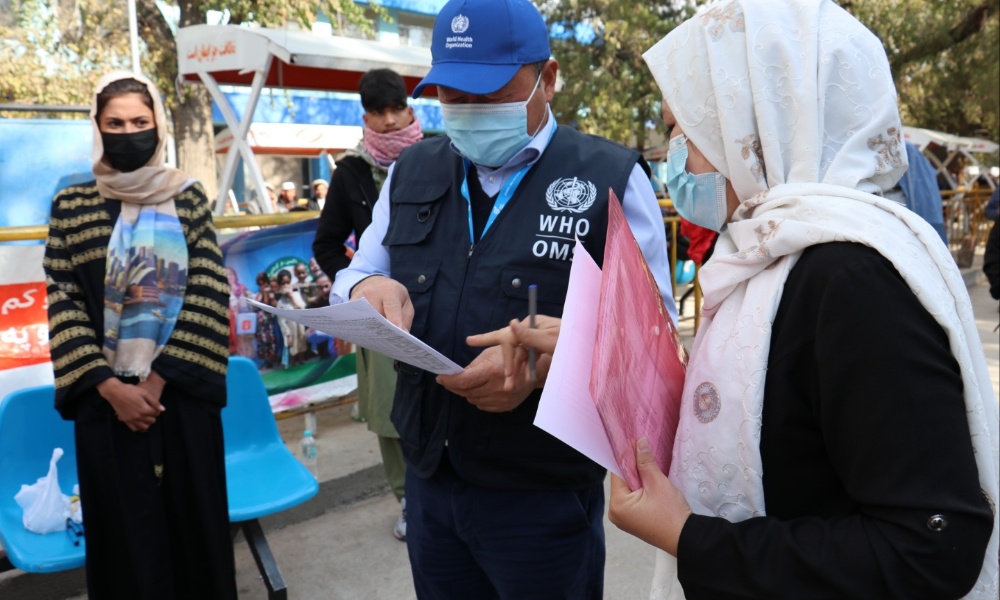
The World Health Organization (WHO) in Afghanistan is deeply concerned that funding shortages could force the closure of 80 percent of WHO-supported essential health care services across the country.
Millions of people, including vulnerable populations such as women, children, the elderly, the displaced and returnees, will be left without access to critical medical care, the organization said in a statement.
As of 4 March 2025, 167 health facilities had shut down due to funding shortages, cutting off lifesaving medical care to 1.6 million people across 25 provinces.
WHO warned that without urgent intervention, another 220 facilities could close by June 2025, leaving an additional 1.8 million Afghans without access to primary health care.
In the worst affected regions – Northern, Western and Northeastern Afghanistan – more than a third of health care centres have shut down, raising alarms about an imminent humanitarian crisis.
“These closures are not just numbers on a report, they represent mothers unable to give birth safely, children missing lifesaving vaccinations, entire communities left without protection from deadly disease outbreaks,” said WHO Representative and Head of Mission in Afghanistan Dr Edwin Ceniza Salvador.
“The consequences will be measured in lives lost.”
Afghanistan is already battling multiple health emergencies, including outbreaks of measles, malaria, dengue, polio and Crimean-Congo haemorrhagic fever.
Without functioning health facilities, efforts to control these diseases are severely hindered. Over 16 000 suspected measles cases, including 111 deaths, were reported in the first two months of 2025. With immunization rates at critically low levels (only 51% for the first dose of the measles vaccine and 37% for the second), children are at heightened risk of preventable illness and death.
While some donors continue to support Afghanistan’s health sector, funding has been significantly reduced as development aid priorities have shifted. The needs, however, remain immense, and current support is not enough to sustain critical health care services for millions of Afghans, WHO stated.
“This is not just about funding. It is a humanitarian emergency that threatens to undo years of progress in strengthening Afghanistan’s health system,” said Salvador.
“Every day that passes without our collective support brings more suffering, more preventable deaths and lasting damage to the country’s health care infrastructure.”
-

 Latest News5 days ago
Latest News5 days agoAfghanistan’s reconstruction is in the interest of EU: Uzbek president
-

 Latest News4 days ago
Latest News4 days agoMinistry of Economy calls on US to release Afghanistan’s frozen funds
-

 Latest News5 days ago
Latest News5 days agoUS won’t rest until all Americans detained in Afghanistan brought home: Rubio
-

 Latest News5 days ago
Latest News5 days agoBulgaria brings five people to trial over deaths of 18 Afghan migrants
-

 Latest News4 days ago
Latest News4 days agoPakistan ‘extends’ deadline for a week for Afghans to leave the country
-

 Business5 days ago
Business5 days agoGold climbs to record high as tariff worries bolster safe-haven demand
-

 Sport4 days ago
Sport4 days agoIPL 2025: Batters in race for prestigious Orange Cap
-

 World4 days ago
World4 days agoAs Iran tensions build, US military moves warplanes to reinforce Middle East




